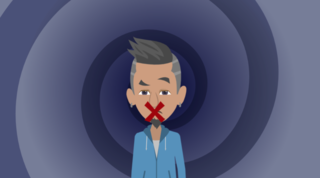Environment
Are Nuanced Conversations Under Threat From Cancel Culture?
How To Create Safe Conversations on Polarizing Subjects
Posted July 15, 2020 Reviewed by Gary Drevitch

The tragic death of George Floyd and others has exposed weaknesses in the way we communicate with one another. Many people are walking on eggshells wondering what to say and how to say it, or worse, some people don’t feel safe to share their viewpoints out of fear of reprisal.
Cancel culture has become a common description for the behaviors of shaming, ostracizing, and boycotting individuals for holding controversial opinions.
While cancel culture originated as an online form of boycotting celebrities who caused offense, the practice is becoming a commonplace behavior in daily civic life and the opinions judged as controversial are more frequently the types commonly held by large portions of the population.
When the threat of being canceled becomes a daily preoccupation, honest conversations do not happen and real understanding cannot be achieved.
As members of the Science of Diversity research team, we have developed a diverse six-person team that specializes in facilitating difficult conversations that promote understanding between participants. Our team lives in different cities throughout the U.S. and Europe. Just to name a few of our differences, the team represents various regions, cultural backgrounds, sexual orientations, races, and religions.
Yet, in spite of these differences, members of our team are not afraid to have conversations about polarizing subjects. In fact, we discuss controversial subjects all the time. Sometimes we share similar viewpoints about an issue, but we don’t expect that we’ll always reach consensus. Our conversations are successful because we cultivate an environment of safety and a commitment to scientific thinking.
Safety is often rooted in establishing norms such as mutual respect, trust, authenticity, and feeling valued despite any differences that arise. Having a diverse team of individuals that model and embody these attributes can help facilitate intergroup conversations as it creates neutrality and demonstrates trust through vulnerability and risk-taking when expressing divergent views.
How did our team of six uniquely diverse individuals get to this place? It was by using the Science of Diversity method to create the conditions conducive to having nuanced, evidence-based conversations, that fostered non-reactive (or reflective) communication skills instead of merely exchanging emotionally charged opinions.
When working and facilitating conversations with students in our live online Harvard "Psychology of Diversity" course or with clients such as GlaxoSmithKline, this method is an invaluable tool. As a starting point, we recognize that individuals come to the table with different opinions and rather than judging an opinion as right or wrong in advance, scientific thinking encourages us to interrogate our opinions through research, observation, logic, and data.
When we feel safe to examine our opinions with others, we can learn much more than whether it is right or wrong. We can explore how an opinion is formed, the impact it has on our identities, and how it informs our perceptions of others. Conversations about race are complex and require nuance, but without the safety of a facilitated environment of mutual respect, it becomes difficult to reach the levels of complexity where true understanding and learning occur.
When discussing controversial or contentious subjects, it is helpful to try to create a safe and open space for individuals to both freely express their opinions, while at the same time being open to hearing opposing viewpoints.
Conflicts that result from individuals expressing differing views may be a common occurrence during these difficult conversations on polarizing topics such as race, justice, and gender, and when these disagreements occur, it is important to fall back upon the science of diversity methodology of encouraging participants to view the topic at hand through a scientific lens, instead of a personal viewpoint.
As individuals, we often bring our own personal biases into conversations, especially when discussing subjects such as race, and as a result, discussions can often be derailed. Relying upon established, peer-reviewed data when discussing these topics can help lower intergroup tensions, and provide a guiding direction when further discussing the topic.
In summary, during these exceedingly polarized times, being canceled can become a daily preoccupation. Fear of judgment and reprisal are very real. However, nuanced conversations can be achieved by using The Science of Diversity® method which through a scientific lens, creates a psychologically safe space where individuals with opposing views can not only express these views in safety, but where both individuals can hear and appreciate the other side.
This article was coauthored with Brian Chin, Marcelle Giovannetti, Lizbeth Jacobs & Marcelo Soares.
Copyright © 2020 Mona Sue Weissmark. All Rights Reserved.
References
Boger, P. (Host). (2020, February 5). NPR Podcast: On Science Distilled. Dr. Mona Sue Weissmark discusses, Diversity: Are we thinking about it all wrong? [Audio Podcast]. https://www.kunr.org/post/diversity-are-we-thinking-about-it-all-wrong#stream/0
Jacobs, L. (2020, May 20). JR Gaillot talks about the Harvard course The Psychology of Diversity [Video]. YouTube. https://youtu.be/ALaZs--ToX0
Jacobs, L. (2020, April 20). Harvard Culture Lab Innovation Fund Educational E-Learning Videos proposal [Video]. YouTube. https://youtu.be/R8REWibWHB8
Jacobs, L. (2019, August 22). Is banning bias possible? [Video]. YouTube. https://youtu.be/D9AxoQC8Jvc
Jacobs, L. (2019, July 24). Podcast Psychology of Diversity and Science of Diversity® [Video]. YouTube. https://youtu.be/W_AfqGJAsjk
Jacobs, L. (2019, June 13). Dr. Mona Sue Weissmark: Dr. Mona Sue Weissmark. Behind the research: The Science of Diversity [Video]. YouTube. https://youtu.be/EARiynV0svQ
Jacobs, L. (2019, June 13). Dr. Mona Sue Weissmark: What does the research say? [Video]. YouTube. https://youtu.be/FKa2QAIJqq4
Jacobs, L. (2019, June 13). Dr. Mona Sue Weissmark: What does the research say? [Video]. YouTube. https://youtu.be/FKa2QAIJqq4
Jacobs, L. (2019, March 18). Preview the Harvard Summer class The Psychology of Diversity & The Science of Diversity [Video]. YouTube. https://youtu.be/23iZpx9WfmE
Jacobs, L. (2019, February 22). Psychology of Diversity Experience Harvard Summer and Extension Schools [Video]. YouTube. https://youtu.be/3k_m7jk8__4
Jacobs, L. (2019, February 11). The Science of Diversity: Why diversity programs fail [Video]. YouTube. https://youtu.be/hgX4WyopX6Y
Jacobs, L. (2018, April 23). Psychology of Diversity trailer Harvard Summer & Extension Schools [Video]. YouTube. https://youtu.be/u5LJm2hbYhA
Jacobs, L. (2018, April 21). Harvard Summer & Harvard Extension Psychology of Diversity our students are saying... [Video]. YouTube. https://youtu.be/lAc4-SlRH18
Jacobs, L. (2018, January 11). Psychology of Diversity-Harvard Summer & Extension Schools-former student describes the course [Video]. YouTube. https://youtu.be/oUr44lX5ZR4
Jacobs, L. (2017, October 31). Psychology of Diversity-Harvard Summer & Extension Schools-former student describes the course [Video]. YouTube. https://youtu.be/9PVbGyuLGpw
Jacobs, L. (2017, October 31). Psychology of Diversity-Harvard Summer & Extension Schools-former student describes the course [Video]. YouTube. https://youtu.be/fXQyTFszb3k
Jacobs, L. (2017, October 31). Psychology of Diversity-Harvard Summer & Extension Schools-former student describes the course [Video]. YouTube. https://youtu.be/SxZ6Gw2Xrp0
Jacobs, L. (2017, October 30). Psychology of Diversity-Harvard Summer & Extension Schools-former student describes the course [Video]. YouTube. https://youtu.be/xkc5FdcQEvc
Jacobs, L. (2017, October 27). Psychology of Diversity-Harvard Summer & Extension Schools-former student describes the course [Video]. YouTube. https://youtu.be/N1uB_WUtY_A
Jacobs, L. (2017, October 27). Psychology of Diversity-Harvard Summer & Extension Schools-former student describes the course [Video]. YouTube. https://youtu.be/ZwteqtT6Qm8
Jacobs, L. (2017, October 27). Psychology of Diversity-Harvard Summer & Extension Schools-former student describes the course [Video]. YouTube. https://youtu.be/YdSDr6C0OvI
King, M. (Host). (n.d.). Mona Sue Weissmark, PhD: Why diversity training doesn’t work. [Audio Podcast]. https://thefixpodcast.org/episodes/mona-sue-weissmark
Weissmark,M. (2020, February 18). Advice to Students: Learn to Think Scientifically. Harvard Gazette. https://news.harvard.edu/gazette/story/2020/02/embrace-logic-to-improve-both-education-and-society/
Weissmark, M. (2020). The Science of Diversity. Oxford University Press, USA.
Weissmark, M. (2004). Justice Matters:Legacies of the Holocaust and World War II. Oxford University Press, USA.
Weissmark, M. & Giacomo, D. (1998). Doing Psychotherapy Effectively. University of Chicago Press, USA.




